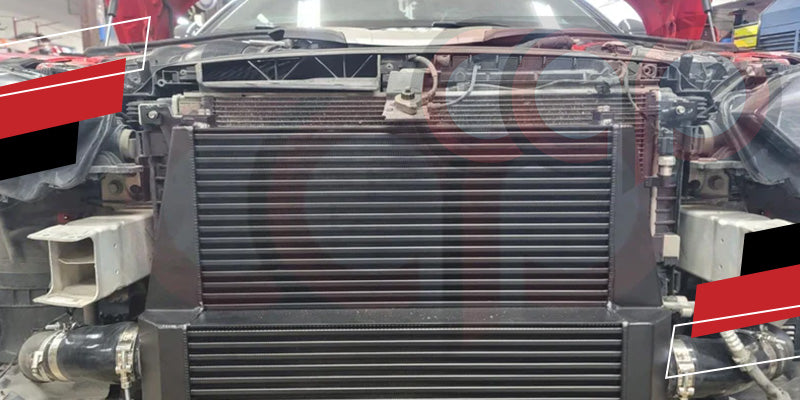
Account
Country
AUDI A8/S8/RS8
AUDI R8
AUDI Q3/SQ3
Audi Q8/SQ8


Intercoolers breathe new life into turbocharged engines, yet they might not deliver the performance gains you're envisioning. The allure of a 'turbo-charged engine' is undeniable. With the promise of boosted performance, reduced engine size, and improved fuel economy, turbo systems have become a hallmark of efficiency and power. But it's not all about simply pushing down on air.
In turbocharged engines, air is compressed before fuel injection. This compression packs oxygen molecules closer, allowing for more fuel in the same space as a naturally aspirated engine, leading to increased efficiency and more power. However, there's a catch: as air is drawn into the turbocharger and boosted, it heats up significantly. Hot air can be detrimental to the engine, adversely affecting the combustion process.
So, how does an engine manage to keep this dense air cool? Enter the intercooler system. This guide will delve into what an intercooler is, its crucial role in your engine, and the potential issues that can arise without proper maintenance and upgrades
The heart of a turbocharged engine's performance lies in its turbo system. This system relies on a turbo which forces more condensed air into the combustion chamber. But, with this increase in air and pressure comes a rise in temperature, which is where the intercooler plays its role.

An intercooler is a heat exchanger used to cool a gas after compression. It receives hot air from the turbocharger and cools it down as it passes through, similarly to how the cooling process in a car’s radiator works.
This cooling allows the air to enter the engine at a significantly lower temperature. The principle behind using an intercooler is rooted in basic physics: cooler air is denser than hot air, meaning it contains more oxygen in the same volume. This increase in oxygen leads to more efficient combustion and better overall engine performance.
The most commonly asked question among forums is “Do Intercoolers Increase Horsepower?”. The straightforward answer is no.A turbo intercooler does not directly add horsepower to your car. Nonetheless, it significantly enhances performance by providing a more oxygen-rich environment for combustion. This enables more aggressive engine tuning while reducing the risk of engine damage.
A lot of people in the car community like to refer to a term called heat-soak.
Related: Benefits Of Adding A High Flowing Turbo Inlet | Audi 3.0T
During intensive driving, the engine generates substantial heat, leading to a phenomenon known as heat soak. This can overwhelm the standard intercooler, reducing its efficiency. An upgraded intercooler combats this issue by efficiently managing higher temperatures, thus preventing power loss.
Heat soak is also a common issue in places with hot climates. If you live anywhere like Florida, Arizona, California or Australia, going for a bigger intercooler upgrade is one of the first mods to deal with heat soak.
Related: Why You Need To Get Rid Of Your Catalytic Converters On Audi 3.0T?
There are mainly two types of intercoolers:
Most factory-standard vehicles come equipped with Tube & Fin intercoolers, which are lighter and sufficient for standard driving. However, the Bar & Plate design, typically found in aftermarket upgrades, offers improved efficiency and performance.
Intercoolers also come in two types in terms of function: air-to-air and air-to-water. Each has distinct features and advantages.
This type utilizes water to reduce the temperature of compressed air. Water circulates through the unit, absorbing heat from the air. Once heated, the water is directed to a radiator or cooling circuits for re-cooling. Air-to-water intercoolers are compact, fitting easily into tighter engine spaces. They excel in a broad temperature range due to water's superior heat absorption compared to air.
Most turbocharged vehicles are equipped with air-to-air intercoolers. Despite the higher cooling efficiency of air-to-water types, their liquid can overheat without an auxiliary radiator. In contrast, air-to-air intercoolers use external airflow and cooling fins to cool compressed air. They are favored for their affordability, simplicity, light weight, and widespread popularity among car enthusiasts.

The true advantage of upgrading your car with an aftermarket turbo intercooler lies in its capacity to handle more aggressive tuning while avoiding the risks of detonation. Additionally, a bigger intercooler offers improved resistance to heat soak. This means you can enjoy extended sessions on the drag strip or the race track, maintaining consistent power without the worry of performance drops due to overheating.
Related: Best B9 S5 Mods
Intercoolers are generally straightforward systems, but they're not immune to problems. Most issues stem from installation errors or leaks. Here's a brief overview of what to look out for:
Often, issues occur in the rubber boost hoses and their clamps. Over time, these hoses can deteriorate and clamps may lose their grip, leading to air leaks. Symptoms include reduced car performance and possibly a 'whooshing' sound. The fix is relatively easy: replace the hoses and clamps. This can be a DIY job or handled by a professional. If you have a diesel car you’ll see black smoke and loss of power when you have a leaking intercooler hose.
Intercoolers are the first thing you’re most likely to hit. Positioned in front of the car they’re prone to break because of stones, undercarriage damage or just light front end crashes. Sometimes rock chips can also get inside and block the fins. This can affect the cooling fins or even puncture the tubes, leading to reduced efficiency or boost leaks. Unfortunately, severe damage might require a complete intercooler replacement.
A bad turbocharger will damage your intercooler. The oil accumulates inside the intercooler, hampering its performance and potentially degrading engine function. To diagnose, inspect the boost hoses for oil traces. If oil is present, the intercooler should be removed and cleaned thoroughly with an engine degreaser.
Fun Fact: Diesel runaway occurs when a bad turbo leaks oil into the intercooler, leading the engine to uncontrollably use its own oil supply. This results in the engine's RPMs rapidly increasing to maximum levels, continuing until all the oil is consumed, which ultimately causes the engine to seize.
Related: Audi S6 Evolution
When an intercooler pipe comes off, it leads to a significant drop in engine performance due to the loss of turbo pressure. Additionally, the engine may run rougher and be more susceptible to overheating, as the intercooler is crucial for cooling the air entering the engine.
Worn turbo seals or oil return pipes can leak oil, which results in excessive oil consumption. This causes the intercooler to be filled with oil.
In factory form, all oil fumes circulate in a closed-circuit setup due to emissions requirements. It is normal to find the intercooler (core and Y-pipe) contaminated with oil as a result of the factory setup. First of all, understand where the oil comes from and the effect of it in the intake.
Simply installing a bigger intercooler is unlikely to significantly enhance power. This is because the original ECU programming may not automatically adjust boost levels or ignition timing in response to the reduced air charge temperatures provided by the larger intercooler.
Read Next: Audi S4 Evolution